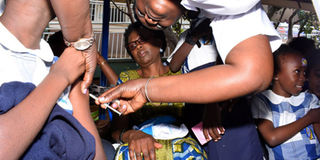Why people doubt vaccines

Exemplary. The Health minister, Dr Jane Ruth Aceng, (in spectacles) looks on as one of her child is immunised last Thursday at Green Hill Academy in Kampala. PHOTO BY MICHAEL KAKUMIRIZI
What you need to know:
- There are legal provisions to deal with parents who defy immunisation campaigns. According to the Immunisation Act, one faces six months in jail or pay a fine of Shs240,000 or both.
Vaccines are considered one of the biggest success stories to modern medicine.
The World Health Organisation (WHO) estimates that at least 10 million deaths were prevented between 2010 and 2015 as a result of vaccinations around the world. This is why the Uganda government over the years enlisted a number of vaccines into the national immunisation programmes, which has seen an increase in the number of immunisable diseases.
For some Ugandans, however, these vaccines are “part of a hidden agenda” to make their daughters infertile. Others claim the vaccines are still on a trial stage and may cause untreatable conditions. The trend of people resisting vaccines is not unique to Uganda and it has become a major concern for governments and WHO, which has listed the trend as “one of the 10 threats to global health in 2019”.
The ongoing measles and rubella mass immunisation campaign has faced similar resistance and doubts from the public even after reassurance from the Health ministry that the vaccine is safe. This prompted Dr Ruth Jane Aceng, the Health minister, to have her daughter at Greenhill Academy immunised publicly and the pictures shared on social media as an assurance that the vaccine is safe.
Why people are doubtful
During last week’s mass immunisation campaign, our survey indicated a drop in the number of pupils’ attendance in some schools, which was attributed to parents shunning the campaign.
Some of the people this newspaper interacted with expressed fears, referring to the Hepatitis B vaccine saga last year.
Prof Vinand Nantulya, the chairperson of One Dollar Initiative, a private sector that has embarked on soliciting for alternative funding for HIV, said: “The Ugandan public is a doubting public; I do not know why. It looks as if Ugandans have lost self-confidence, lost confidence in government systems and do not take government advice very seriously otherwise this vaccination is a very good idea.”
Health workers have mostly attributed the doubts that dominated the immunisation campaign to lack of information, peer pressure and side effects.
Dr Deogratias Munube, a consultant paediatrician, said the terminology called vaccine hesitancy is a result of people not being sure of why vaccines are being introduced but they are also worried of side effects.
“The child might get fever [and] those are some of the problems that people see but once you explain to them why they occur, then they are less worried,” Dr Munube said.
Dr Sabrina Kitaka, a paediatrician with Mulago hospital, added that where some parents who do not take their children to school will obviously not take their children for immunisation.
Some parents have blamed a religious group dubbed Triple Six, which disrupts the vaccination programme by quoting Mark 1:14, 1st Corinthians 15:1 and Revelations 13:16-18, respectively.
Why vaccines are important
Dr Tegegn Yonas Woldemariam, the WHO country representative, said the measles-rubella vaccine underwent vigorous scientific research over the years and the vaccine was proven safe.
Since 2016, a total of 296,304 suspected measles cases have been reported. Every year – for the past four years – at least 120 districts have been reporting the varying numbers of suspected cases. Uganda is experiencing a double epidemic of rubella and measles at the ration of 1:2.
According to the Ministry of Health, the vaccine will prevent diseases and protect children as they grow. “In future we do not have to deal with abnormalities and we do not have to spend resources treating measles, which would be directed to doing more useful things,” Dr Aceng said.
Effects of rubella
Review of data from Uganda Heart Institute indicates that at least 60 per cent of children at the institute born with heart defects is as a result of their mothers having suffered rubella.
In 2016, there were 67,924 suspected cases of measles reported in 121 districts with 139 cases of measles confirmed, and 289 confirmed cases of rubella. As of 2019, there has been 770 confirmed measles cases, and 294 confirmed cases of rubella.
Way forward
Given the doubts about vaccines from some sections of the public, many stakeholders have asked government to improve the packaging of immunisation messages. There should be emphasis on the importance of vaccines done over a long period of time.
“People are not properly informed and the responsibility lies with the health authorities to educate people on why the vaccination is carried out. We need to take sufficient effort to explain to the public… it is [a] question of how to communicate with the public,” Prof Nantulya said.
Why some children missed out
At least 250 pupils of Kawoko UMEA Primary School in Kamuseenene Village, Gomba District were sent back home and their school closed after heavy rain destroyed the school toilet on Wednesday.
Dr George Kiwanuka, the Gomba District health officer, on Thursaday said the incident affected the immunisation campaign.
By last Wednesday, more than one million children had been immunised. The campaign has been extended to today.
[email protected]




